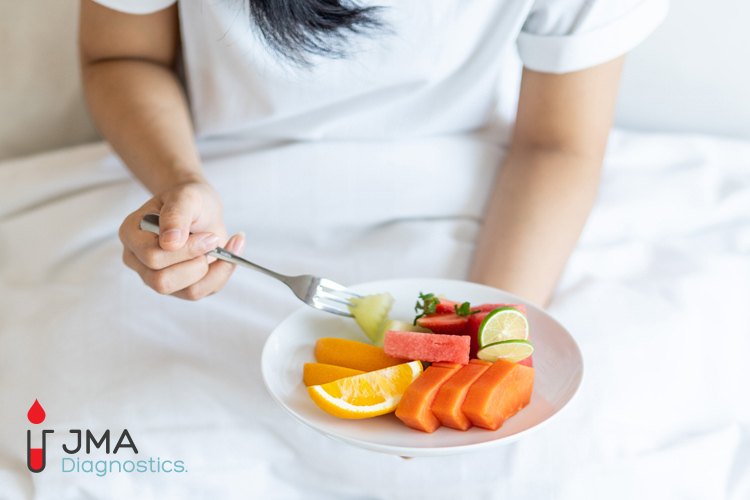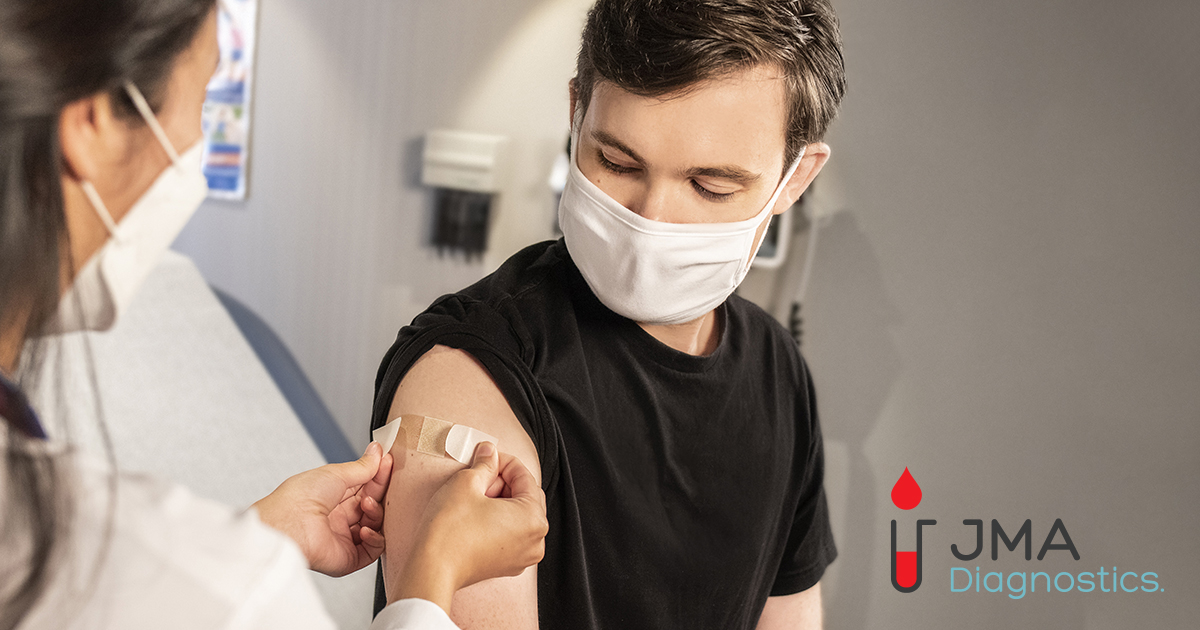Our Blogs
MARCH 22, 2023
Is fasting necessary before a blood test? Precautions and preparations

When doctors ask you to take blood tests, they can ask you to fast for some time before. But what does that mean? Why do you need to fast before getting your blood sampled?
To make things clear for you, we will answer the most frequently asked questions. Can I drink my coffee, take my medicine or smoke a cigarette before my blood tests?
We will give you advice so you can prepare better for your appointment and facilitate the experience.
Make an appointmentWhy do you need to fast before a blood sample?
After eating food or drinking a liquid that is caloric, the blood circulating throughout your body transports nutrients from the digestive system to the various organs, tissues, muscles, etc.
The ingested food contains lipids and carbohydrates (fats and sugars) which circulate in the sampled blood, and potentially falsify the results.
The presence of fat in samples affects the blood quality and prevents it from mixing well for some tests.
Here are 5 examples of blood tests that require fasting:
- Glucose
- Hyperglycemia
- Cholesterol, HDL, LDL and triglyceride
- B.12 vitamin
- Folic acid

What to do before blood tests?
TIPS TO BE WELL PREPARED FOR A BLOOD TEST AT HOME OR IN A SAMPLING CENTER
- The day before the appointment, eat a light meal with water.
- It is important to not change your eating habits too much before the appointments so you can get results linked to your lifestyle.
- Drink water in the evening so you are not too hungry.
- In the morning, drink a large glass of water, this will help you do your sample during the appointment, will keep you hydrated and will make the sampling easier, especially if you need to do a urine sample.
- Do not hesitate to drink because dehydration reduces the presence of water in your blood and the width of your veins, which makes sampling more difficult for you and the nurse.
CAN I DRINK MY COFFEE IN THE MORNING BEFORE A BLOOD TEST?
No, be it black coffee or with sugar and creme, coffee contains nutrients, which could falsify the results.
WHAT ABOUT CIGARETTES BEFORE A BLOOD TEST?
It is not recommended to smoke a cigarette before the appointment. It could have an effect on some results. Smoking can increase the white blood cells level in your blood, so it is better to avoid smoking during the 10 to 12 hours before the sampling.
CAN I DRINK ALCOHOL BEFORE A BLOOD TEST?
It is important to respect the 48 hours fasting period that is frequently requested for blood tests
A single drink can alter the results, causing a wrong interpretation by the doctor. The quality of the serum (blood) could be affected, which can abnormally increase triglycerides. Triglycerides allow the transportation of fatty acids, and are also a primary source of energy for the body.
IS CANNABIS CONSUMPTION ALLOWED BEFORE A BLOOD TEST?
Like cigarettes, cannabis consumption through inhaling (smoke) increases the number of white blood cells in the blood. Large cannabis intake could influence the testosterone level. Cannabis can also have effects on blood pressure, it is therefore important to avoid its consumption before a cardiac test like an ECG or a Holster.
Consumption can bring about a decrease in body temperature, which affects the venous system and makes blood sampling more difficult.
It is recommended to avoid cannabis consumption of all forms, 24 hours before the appointment.
CAN YOU TAKE YOUR MEDICATION BEFORE A BLOOD TEST?
It is recommended to take your medicine before the appointment like always, but some medicine can influence the results.
We mention the exceptions when we schedule the appointment. Medical marijuana consumption is also part of this category.
I AM PREGNANT, SHOULD I BE FASTING BEFORE MY BLOOD TEST?
Sadly, some pregnancy routine tests require you to be fasting. However, the recommended fasting is only 8 hours in this precise situation.
CAN I DO PHYSICAL ACTIVITY BEFORE A BLOOD TEST?
It is recommended to avoid intense physical activities 24 hours before the appointment to avoid irregularities in the blood test.
Creatine kinase can be falsely high and the PSA (prostate test) can also be high after a long period on a bicycle.
However, there is no problem with light training.
THE IMPORTANCE OF STRESS MANAGEMENT BEFORE A BLOOD TEST
For some, blood tests can be a source of stress. Either because of a fear of needles or the pain that comes with it. This is why it is advised to practice breathing before the blood sampling.
By taking deep breaths through the nose and exhaling through the mouth, it is possible to decrease blood pressure.
It is possible to get the ‘’Emla’’ cream in pharmacies. It has to be applied on the interior of your elbow about 30 minutes before your appointment to desensitize the skin and therefore reduce pain.
If you have receding veins, this simple advice can make the experience much easier: simply warm up the elbow area with a magic bag to dilate the veins. This will make the veins "expand" and will facilitate the blood tests.

What to do during the blood test appointment
No matter if it is at home, in a company or in a clinic, we offer a calm and comfortable environment to make the experience better.
- Calm and tranquility make blood sampling easier, so it is recommended to inhale well through the nose and exhale slowly through the mouth to relax.
- Do not be afraid to communicate with the nurse to reassure yourself about any possible questions. Our nurses are qualified and near the clients.
QUALITY OF JMA DIAGNOSTICS BLOOD TEST SERVICE
At JMA Diagnostics, we have a policy of two stings per appointment. When conditions are not optimal for blood sampling, we move the appointment to the next available date that fits your schedule.
It prevents appointments from being too painful and prevents negative blood tests experiences.
SPECIFIC MEDICAL TEST
Some tests do not require fasting, but need to be done in the morning or afternoon. Some results can change depending on the time of day. For example, a serum cortisol test is often required at the start and the end of the day, because the results vary depending on the time of the day.
IS FASTING NECESSARY FOR A URINE TEST
It is not necessary to fast for urine tests. To be fasting or not has no influence on the result. However, some tests need to respect some restrictions, like quantity, delay between two urines or the first stream.
IS FASTING NECESSARY FOR STOOL TESTS
There are no food restrictions for stool tests. You can keep your eating habits with no worry. However, it is recommended to avoid laxatives during the collecting period.
What should you do after the blood test
HYDRATION AND NOURISHMENT BEFORE A BLOOD TEST
Whether the sampling requires fasting or not, it is recommended to have a small bite after the blood test. No matter if it is a muffin or a tender bar, it is also a good idea to have water with it.
GETTING A BRUISE FROM A BLOOD TEST
It is possible that a bruise forms after the blood sampling, it is a completely normal reaction. You do not have to worry. Applying pressure on the sting after the sampling reduces the risk of bruises.
RELAXATION AFTER A BLOOD TEST
If you are prone to reflex syncopes (pressure drops), we recommend to sit or lie down after the samples are taken. This makes you avoid drops and it accelerates recuperation.
OUR BLOOD TEST SERVICE OFFERS FAST RESULTS
When you choose JMA Diagnostics, you get fast results that will be transmitted to you and your doctor in the following 24 to 48 hours for the vast majority of tests. Some specific tests require 6 open days, but they are rare.
To resume: tips for a successful blood test
- Respect the 12-hour fast before the appointment by consuming only water, and avoid eating or drinking anything other than water, including coffee and cigarettes.
- Avoid alcohol 48 hours before blood draws for cholesterol tests.
- Take your medications as usual, unless otherwise instructed by your healthcare professional.
- Avoid physical activity and stress 24 hours before the blood test appointment, controlling your breathing to help you manage stress.
- Communicate your expectations and your fears to the nurse to build your confidence.
- After the blood test, have a small meal and drink water.
24 hours before the blood test appointment, you need to avoid intense physical activity and stress. Controlling your breathing can help manage stress before and during the appointment. Share your expectations and fear to the nurses, they will know how to reassure you. After the blood test appointment, eat a bit and drink a glass of water.
Our scheduled services improve the blood sampling experience because it lets you know the exact hour when you need to start fasting.
For blood tests either in the comfort of your home, in our clinics or in the office, the JMA Diagnostics team makes sure to offer a professional service, tailored to the client's needs.
For an appointment or more information, contact us!